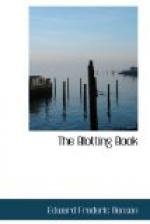“June 21st.
“To Godfrey Mills, Esq.
“You damned brute, I will settle you. I hear you are coming back to Brighton to-morrow, and are getting out at Falmer. All right; I shall be there, and we shall have a talk.
“Morris Assheton.”
A sort of purr went round the court; the kind humane ladies and gentlemen who had fought for seats found this to their taste. The noose tightened.
“I have here also an envelope,” said the prosecutor, “which was found by Mr. Figgis and Mr. Wilkinson in the waste-paper basket in the sitting-room of the deceased. According to the expert in handwriting, whose evidence you will hear, it is undoubtedly addressed by the same hand that wrote the letter I have just read you. And, in his opinion, the handwriting is that of the prisoner. No letter was found in the deceased man’s room corresponding to this envelope, but the jury will observe that what I have called the negative of the letter on the blotting-paper was dated June 21st, the day that the prisoner suspected the slander that had been levelled at him. The suggestion is that the deceased opened this before leaving for London, and took the letter with him. And the hand, that for the purposes of misleading justice, robbed him of his watch and his money, also destroyed the letter which was then on his person, and which was an incriminating document. But this sheet of blotting paper is as valuable as the letter itself. It proves the letter to have been written.”
* * * * *
Morris had been given a seat in the dock, and on each side of him there stood a prison-warder. But in the awed hush that followed, for the vultures and carrion crows who crowded the court were finding themselves quite beautifully thrilled, he wrote a few words on a slip of paper and handed it to a warder to give to his counsel. And his counsel nodded to him.
The opening speech for the Crown had lasted something over two hours, and a couple of witnesses only were called before the interval for lunch. But most of the human ghouls had brought sandwiches with them, and the court was packed with the same people when Morris was brought up again after the interval, and the judge, breathing sherry, took his seat. The court had become terribly hot, but the public were too humane to mind that. A criminal was being chased toward the gallows, and they followed his progress there with breathless interest. Step by step all that was laid down in the opening speech for the prosecution was inexorably proved, all, that is to say, except the affair of the stick. But from what a certain witness (Mr. Taynton) swore to, it was clear that this piece of circumstantial evidence, which indeed was of the greatest importance since the Crown’s case was that the murder had been committed with that bludgeon of a stick, completely broke down. Whoever had done the murder, he had not done it with that stick, since Mr. Taynton deposed to having been at Mrs. Assheton’s house on the Friday, the day after the murder had been committed, and to having taken the stick away by mistake, believing it to be his. And the counsel for the defence only asked one question on this point, which question closed the proceedings for the day. It was:




